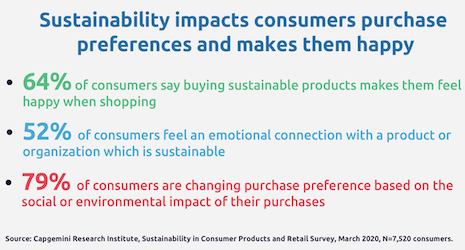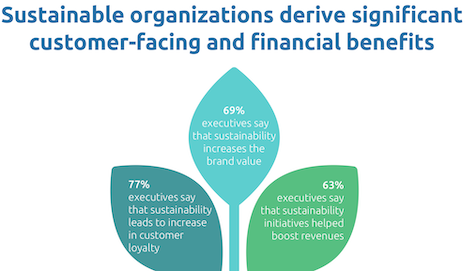- About
- Subscribe Now
- New York,
July 20, 2020

 Capgemini's latest research explore the impact of sustainability on consumption. Image credit: Capgemini
Capgemini's latest research explore the impact of sustainability on consumption. Image credit: Capgemini
COVID-19 has increased consumer awareness and commitment to buying sustainably even more than before, adding urgency to an issue that is accelerating with the ongoing public health crisis worldwide.
Some 67 percent of consumers said that they will be more cautious about the scarcity of natural resources because of the pandemic and 65 percent said that they are thinking more about the impact of their consumption as they ponder the post-pandemic new normal. Seventy-nine percent of consumers are changing their purchase preferences based on social responsibility, inclusiveness or environmental impact, according to a new report from Capgemini Research.
“A challenge that many organizations face is change management,” said Pia Heidenmark Cook, chief sustainability officer of Ingka Group, Leiden, The Netherlands, in the report.
“A perception many organizations have is that sustainability is more expensive,” she said. “However, they do not realize that initiatives like waste reduction or energy efficiency will reduce your operational costs.
“The key challenge that stands in the way of sustainability is change management – showing the business case, why it makes sense, and influencing and inspiring people to understand why it makes a difference.”
 Buying sustainably makes consumers feel happy when shopping. Image credit: Capgemini
Buying sustainably makes consumers feel happy when shopping. Image credit: Capgemini
Sustainable consumer behavior
Sustainability is now affecting influencing consumer behavior, with 53 percent of consumers across the board, and 57 percent of those ages 18-24 saying the have changed their loyalties to lesser-known brands because they were sustainable.
Fifty-two percent of consumers said they share an emotional connection with products and brands that they perceive as sustainable.
Another 64 percent said that buying sustainable products makes them feel happy about their purchases, with 72 percent of those ages 25-35 saying this, according to Capgemini’s “Consumer Products and Retail: How sustainability is fundamentally changing consumer preferences” report.
Still, even as sustainability is becoming more embedded in consumer culture and more of a priority among consumers, both consumers and brands still have a lot more to learn about sustainability.
The report revealed that there is a gap between what consumers think they know and what they actually know about sustainability, with 78 percent of consumers not realizing that it takes 1,000 liters of water to produce a chocolate bar and 68 percent unaware that a burger produces as many emissions as driving 15km in a large car.
Still, some 68 percent of consumers who buy these products said they would be open to buying more sustainable versions once they were educated on the matter.
“This highlights the need for more sustainability-related information to be available for consumers and reinforces the importance of brands driving the sustainability agenda,” the report said.
“However, a knowledge gap also exists among retailers and manufacturers who think their shoppers know more than they do,” the report continued.
Some 65 percent of executives said their customers are aware of their sustainability initiatives, yet 49 percent of consumers said they do not have information to verify sustainability claims from brands and a whopping 44 percent say they do not trust product sustainability claims.
The report found that 80 percent of companies cited cost as a challenge in scaling sustainability initiatives.
“The most commonly scaled initiatives are fair labor policies and safe working conditions, with 48 percent of organizations claiming to have achieved scale in these areas,” the report said.
“In contrast, sustainable IT, which involves reducing the impact of the digital footprint (such as energy efficiency in data centers), is being scaled by just 18 percent.
“Moreover, despite the pandemic bringing a renewed focus on the circular economy, just 18 percent of executives have invested in circular economy initiatives and only 35 percent plan to invest in this area in the next three years.”
 Sustainability drives greater customer loyalty and brand value. Image credit: Capgemini
Sustainability drives greater customer loyalty and brand value. Image credit: Capgemini
Best practices
Capgemini’s report has outlined four best practices for brands to adopt to speed up sustainability within their organizations.
The first is to educate consumers and empower employees to embed sustainable practices to increase consumer awareness of how their sustainability programs work.
The second is to use technology at the core of sustainability initiatives to track and measure the effectiveness of sustainability programs and map it back to broader sustainability goals within the brand.
Third, the report suggests that brands adopt reliable governance for sustainability with objective-setting and reporting processes in place across business units.
Finally, Capgemini suggests that companies collaborate with the broader ecosystem for a larger impact, sharing commitments throughout the supply chain.
“So far, many organizations have viewed sustainability as a bolt-on,” said Kees Jacobs, vice president for consumer goods and retail at Capgemini, in the report.
“However, when baked into an organization’s mission and purpose, sustainability has the potential to entirely change an organization’s relationship with its customers and partners," he said.
“The pandemic has heightened global desire for authenticity and responsibility, particularly from large organizations. As businesses focus on transformation in the wake of the pandemic, they should put sustainability at the heart of their efforts.”
Share your thoughts. Click here